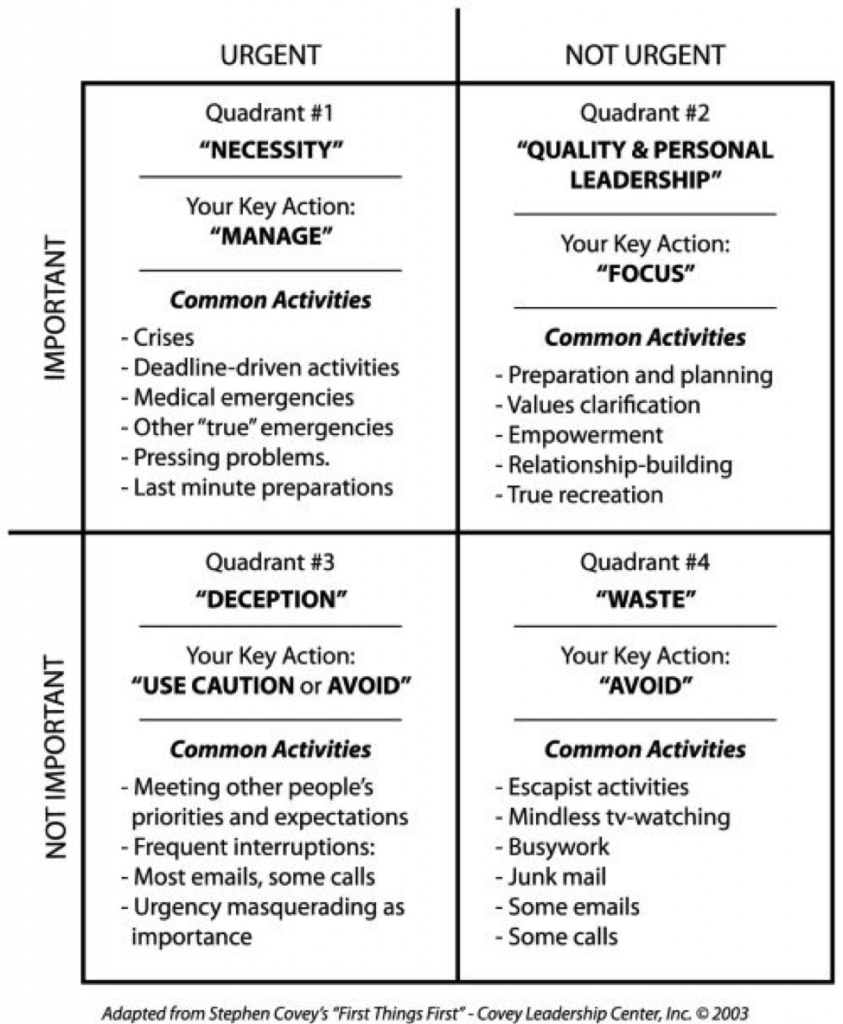We live nowadays in a more unfocused world due to the huge technological development around us. We are surrounded by many devices, such as small laptops, smartphones, PSPs, and iPads, that help us keep connected with social media, email, and other time-consuming activities. These things make you busier and unfocused. Before these gadgets, people would get bored from doing nothing; boredom is rarely found nowadays, as we are always connected to the Internet or gaming through a device. This is putting us in an unfocused state of mind. We spend so much time entertaining ourselves, posting photos about our lives, or acting on the urgent stuff that comes through emails and ignoring the important stuff that hours, days, months, years, and decades are passing very quickly with less action taken on important things. Now generations are spending their lives watching TV and scrolling their Facebook pages just to look at successful people; instead of learning from them and taking action, we keep looking at them and feel depressed due to this lack of focus.
At the time of writing this piece of my book about focus, I feel good. The reason is that I am focusing on this important thing — my book — after stopping writing for the last three to four weeks because I was busy with urgent stuff. Completing my book is not urgent, but it’s very important in the long term, especially after I die. A book is a legacy of your thoughts and ideas that can add value to other people’s lives and makes people remember you. All of us as human beings always drift into the urgent stuff and leave the important stuff that makes us feel great when we do them for later. The solution is to focus and develop a habit to do the important stuff first thing in the morning, or first thing after taking a shower, or first thing after watching a movie. I call this thing “the first thing after a certain break,” because usually after this break our brains are fresher and can better deliver on the important things. However, if you spend your entire day checking email, nothing in your brain is left to act on the important things properly. It’s important to always structure your day and prioritize. Start with your day; when you fix your day, your week will be fixed. After you fix your week, your month will be fixed, and so on, till you fix your entire life by achieving what you want through the power of focus.
Focus is a major thing for productivity and time management that you need to consider. Many people spend all their lives just wasting their time. And then they figure out after 30 years or 40 years that they did nothing – or maybe they don’t ever figure it out. Focus is a must to learn and master new things; you can master it by testing and practicing. Many people are sucked in by distractions; sometimes when they go online, they go to this video, then to that website, then to Facebook, then to email. They had decided to do something important, but then they got distracted by all these things.
There’s software programs that calculate your productivity, looking at which sites you are spending time on and giving you the ability to block some websites. There’s a program that you can use on your computer called RescueTime to track the time that you spend on specific sites and then try to structure your time. You can measure your productivity level for a certain period of time and compare it with your previous or next month’s performance. I use also Anti-Social to block specific social media sites when I start my computer for a specific period of time so I can focus on more important stuff. I also use Freedom to block the Internet completely on my computer when I start it or whenever I want so I can focus on more important things. Using a to-do list and not-to-do list are also essential techniques to help you focus, as is learning how to say “no.”
You can use these tools to increase your productivity and focus. You can also use the time matrix of Stephen Covey. You can see the details of it in the below diagram, which Covey has divided into four quadrants for the four types of activities (Important & Urgent, Important & Not Urgent, Not Important & Urgent, and Not Important & Not Urgent).
The First Quadrant (Urgent & Important)
This quadrant includes activities that are necessities.
Common activities:
– Crises
– Deadline-driven activities
– Medical emergencies
– Other “true” emergencies
– Pressing problems
– Last-minute preparations
The key action word for this quadrant is “manage,” as these important and urgent activities require extreme care in terms of managing them.
The Second Quadrant (Important & Not Urgent)
This quadrant includes quality and personal leadership activities.
Common activities:
– Preparation and planning
– Values clarification
– Empowerment
– Relationship building
– True recreation
The key action word for this quadrant is “focus”; this quadrant is what this chapter of the book is about, as these are the activities where highly successful people are excelling and most people are failing. These activities are important but not urgent, so there’s no time pressure to achieve them; that’s why most people ignore these very important activities. As a result, they miss the big, important achievements in their lives that the real value of their lives is centered around. Think of yourself in a mission in this life to deliver things of great value to others; others can be anybody from your family to any other people in the world. These activities are what will make people remember you; these activities are your great mission and legacy in this life.
The Third Quadrant (Not Important & Urgent)
This quadrant is described by the word “deception,” because the activities of this quadrant are deceptive.
Common activities:
– Meeting other people’s priorities and expectations
– Frequent interruptions
– Medical emergencies
– Most emails, some calls
– Urgency masquerading as importance
The key action words for this quadrant are “use caution” and “avoid”; in this quadrant we need to learn to say “no” more often or delegate to our team to take action on these activities. Outsourcing is a great technique that helps you delegate the unimportant activities. I also use a small whiteboard that I keep next to my desk or sofa where I sit and work. I write on it the major three to five not urgent and important tasks that I have to achieve every day and tick them out throughout the day. These tasks make me feel good when I achieve them and boost my self-satisfaction and energy levels to achieve more throughout the rest of the day.
The Fourth Quadrant (Not Important & Not Urgent)
This quadrant is described by the word “waste,” because the activities of this quadrant are a complete waste of our time and lives.
Common activities:
– Escapist activities
– Mindless TV watching
– Busywork
– Junk mail
– Some emails
– Some calls
The key action word for this quadrant “avoid”; in this quadrant we need to learn to say a big fat “no” more often and learn to take control of our lives to avoid these bad habits and replace them with more productive ones.
When I do something very important the first thing in the morning, let’s say write a chapter of my book — or a certain page, or paragraph, or a section — or work on a project that has been delayed, it really gives me a push throughout the day. This removes this regret factor that I usually feel when I get busy with the urgent stuff. When I just focus on the urgent stuff, it kills all my time and sucks all my energy, so I don’t deliver anything in terms of the important stuff that adds value to my day and life.
When you do the important stuff at the beginning of your productivity session, regardless of whether it’s in the morning or evening, it will make you feel better to complete the other stuff. You always need to give everything its time and divide your time, such as time to spend with your friends, time to spend on important stuff, and time for the urgent stuff. And you delegate as much as you can. These notes will help you be more productive to save time and achieve more.
When I kept creating new projects, I noticed it was draining my focus. However, the more team members you have that you can delegate to on such projects, the more you focus on the important stuff. If you feel distracted by a new project or new idea, put it on your to-do list for future projects. Queue these projects and prioritize till you get the right resources for a team and time to act on them. Don’t distract yourself by so many things; you end up frustrated, you quit, and you achieve nothing.
So when you start your day, you need to have a direction for it. You also need to have a bigger picture for your project or goals, such as to divide them into small goals to take better advantage of your time.
Having focus will direct you to take action. Don’t pick up the habit of opening your mouth when you see the success of other people and getting inspired by them but then taking zero action. Most people get inspired by successful people, but they do not think of what the successful people do. They get inspired when they go to seminars. Many people who get inspired and wowed, when they go back to their normal lives, get into their routine again, their comfort zone, and their rat race, and they get distracted. Then, they end up achieving nothing.
Nobody reads their notes when they go back after a seminar. You need to organize your notes; use, let’s say, Evernote to write your notes so you can access them when you want them, instead of when you just write them on paper and can’t find them later. Finding the right information and tools when you need them is essential to boosting your focus level. I use also iMindMap to draw Mind Maps for some projects or presentations that I want to act on. It will make you focus more, and it will draw for you a plan, steps, and directions to achieve more and be more productive within a very limited time. I use 2Do on my iPhone and Mac or use Evernote for my to-do list. Use a file cabinet to organize your documents in your office or home. All these productivity tools and techniques help you focus more on the important things.
Sometimes, I have more than 10 virtual assistants doing different stuff. Some people, when they see my pages on Facebook and they see the projects that I’m working on, they say, “How are you doing all of that?” Some people, when they come to my city, they don’t contact me because they think I am very busy. I am busy, but I’m more efficient by delegating most of the mechanical and repeated work and focusing only on the important things. So I can meet anybody anytime I want. I can work when I want from anywhere I want.
For instance, when certain tasks are done by me, such as social media, my social media guy is giving me, let’s say, a month plan in advance to approve it for him. And once I approve it, that’s it. He schedules the posts and he does it. But I just trained those guys to do certain stuff. Then they start doing it even better than me.
This is the idea: to train people to do things better than you so you can focus on more important stuff to achieve bigger things and more things in less time. So focus is a very critical and important thing. And you need to really focus on focusing on things in order to achieve. Otherwise, you’re in deep trouble.
Life keeps pushing us out of our focus zone, but we must fight back and learn to develop the habits that allow us to take control of our lives step by step and habit by habit till we take maximum control of our lives and learn to focus more on what we want to achieve to leave this world a better place than we knew it.
Share with us some of the tools and techniques that you use to stay focused in the comment section below please.


